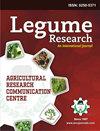Isolation and characterization of native cowpea rhizobia from Wayanad India
IF 0.8
4区 生物学
Q3 AGRONOMY
引用次数: 3
Abstract
In the present study, eight rhizobial strains (RH-1 to RH-8) were isolated from root nodules of cowpea which grows in acidic soils of Wayanad. They were characterized based on morphological, physiological, biochemical and molecular characteristics. The results on plant growth promoting traits showed all isolates positive to IAA production, four positive to ammonia production and five positive for in vitro siderophore production. Three isolates exhibited antagonistic activity and none of them showed volatile cyanogen production. The 16S rRNA gene sequence analysis revealed all the isolates to show similarity to Rhizobium sp. While rhizobia generally have a pH range of 6.5–7.5 for optimum growth, the isolates RH-1. RH-2, RH-4 and RH-8 grew in a liquid yeast extract-mannitol agar medium at pH-4, suggesting acid tolerance in the strain of Rhizobium. The isolates were authenticated for their nodulation and growth promotion of cowpea in a paper cup experiment and four isolates (RH-2, RH-3, RH-4 and RH-5) were evaluated for their growth promotion in cowpea under field condition. It was observed that inoculation of Rhizobium increased nodulation, growth parameters and yield of cowpea compared to uninoculated control. This study showed that these rhizobial isolates with plant growth promoting traits can be used to promote the growth and yield of cow peain acidic soils of Kerala.印度Wayanad地区豇豆根瘤菌的分离与鉴定
本研究从生长在Wayanad酸性土壤中的豇豆根瘤中分离到8株根瘤菌RH-1 ~ RH-8。从形态、生理、生化和分子等方面对其进行了表征。在促生长性状方面,4株菌株对IAA产量呈阳性,4株菌株对氨产量呈阳性,5株菌株对铁载体产量呈阳性。3株菌株表现出拮抗活性,但均无挥发性产氰。16S rRNA基因序列分析显示,所有分离株均与根瘤菌具有相似性,而根瘤菌一般在6.5 ~ 7.5 pH范围内生长最适宜,分离株RH-1。RH-2、RH-4和RH-8在pH-4的液体酵母提取物-甘露醇琼脂培养基中生长,表明根瘤菌具有耐酸性。在纸杯试验中鉴定了分离菌株的结瘤和促生长作用,并在田间条件下对RH-2、RH-3、RH-4和RH-5 4株分离菌株的促生长作用进行了评价。与未接种对照相比,接种根瘤菌可提高豇豆的结瘤率、生长参数和产量。本研究表明,这些具有植物促生性状的根瘤菌分离株可用于促进喀拉拉邦豇豆酸性土壤的生长和产量。
本文章由计算机程序翻译,如有差异,请以英文原文为准。
求助全文
约1分钟内获得全文
求助全文
来源期刊

Legume Research
AGRONOMY-
CiteScore
1.30
自引率
37.50%
发文量
256
审稿时长
6-12 weeks
期刊介绍:
Legume Research An International Journal. The Journal is an official publication of Agricultural Research Communication Centre. It is designed to bring out the original research articles on genetics, breeding, physiology, bacterial avtivity, production, quality, biochemistry and seeds of legumes crops. The objective of the journal is to serve as a forum for scientific community to publish their research findings on legumes ans to provide basis for new research. Journal is being scanned in the important indexing and abstracting services.
 求助内容:
求助内容: 应助结果提醒方式:
应助结果提醒方式:


